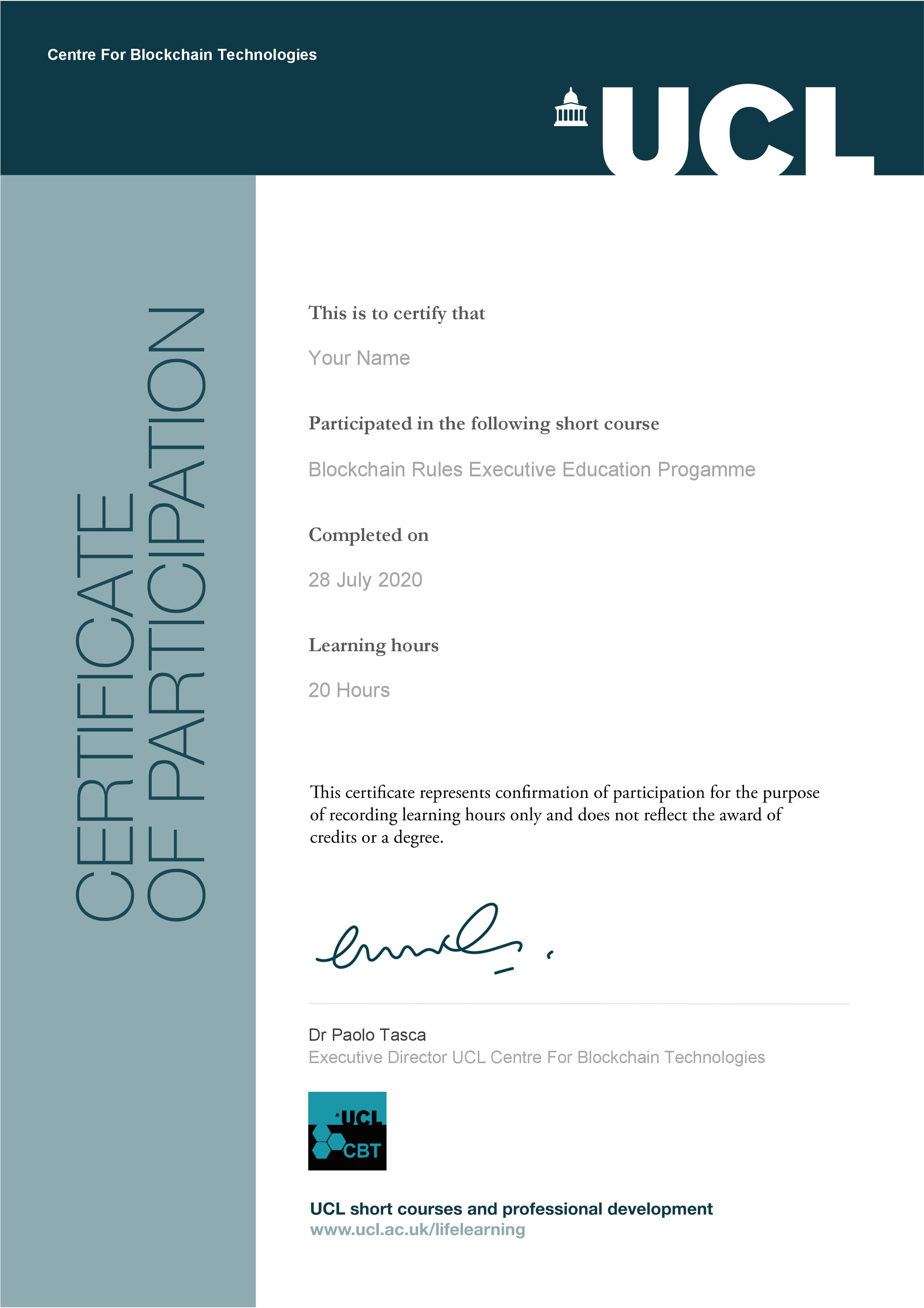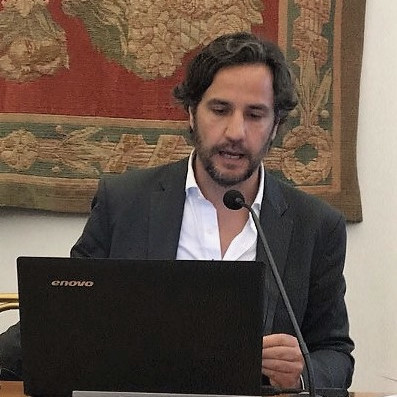Do you understand the rules that govern today’s digital economy?
This Blockchain Executive Education Online Programme brings the world-renowned expertise of the UCL Centre for Blockchain Technologies (UCL CBT) who have designed this course for government officers, managers, legal professions, accountants and engineers interested in studying the foundations of the rules that govern today’s digital economy with a focus on blockchain technologies.
WHEN
03 March 2021 – 31 March 2021
WHERE
Online
LENGTH
9 afternoon sessions
Over 5 Weeks
REGISTRATION
WHEN
03 March 2021 – 31 March 2021
WHERE
Online
LENGTH
9 Afternoon Sessions
Over 5 Weeks
REGISTRATION

Introducing the Programme
Today blockchain is not an immature technology anymore. Corporations in finance and beyond successfully completed blockchain pilots; investments reached over $22.5 billion1 and now are constantly rising. In a few years this technology will completely reshape many industries and government activities.
However, the potential of blockchain technologies is still overlooked by most. Educational materials are often superficial or overly-technical making their understanding of how blockchains will impact in the near future a challenge. Today innovation is the main factor to compete on and blockchain is the key.
The Blockchain Rules course is a “deep dive” into the key economic and legal issues related to breakthrough blockchain technologies. In particular, how blockchain technologies work, how they are regulated and how blockchain technologies can be exploited to innovate will be discussed .
How can blockchains be deployed practically alongside other emerging technologies will be also investigated. These technologies will likely impact like the Internet did twenty years ago. An understanding of blockchain technology rules is necessary to be part of the coming blockchain era.
Learn about the programme through these podcasts!
Blockchain Rules Programme Lead Giovanna Massarotto has created a series of podcasts to introduce this Executive Education programme.
The three podcasts currently available are:
- An introduction to the programme with Giovanna Massarotto
- Interview with Professer Kevin Werbach
- Interview with Bruce Schneier
Keep on the look for more podcasts as they come. These give you a flavour of the kind of expert insights you can gain by taking this programme.

Introducing the Programme
Today blockchain is not an immature technology anymore. Corporations in finance and beyond successfully completed blockchain pilots; investments reached over $22.5 billion1 and now are constantly rising. In a few years this technology will completely reshape many industries and government activities.
However, the potential of blockchain technologies is still overlooked by most. Educational materials are often superficial or overly-technical making their understanding of how blockchains will impact in the near future a challenge. Today innovation is the main factor to compete on and blockchain is the key.
The Blockchain Rules course is a “deep dive” into the key economic and legal issues related to breakthrough blockchain technologies. In particular, how blockchain technologies work, how they are regulated and how blockchain technologies can be exploited to innovate will be discussed .
How can blockchains be deployed practically alongside other emerging technologies will be also investigated. These technologies will likely impact like the Internet did twenty years ago. An understanding of blockchain technology rules is necessary to be part of the coming blockchain era.
The Value This Programme Delivers To You
Recognise the fundamental rules that govern today’s digital economy
The ability to recognise the fundamental rules that govern today’s digital economy (e.g. antitrust law, Internet and data regulation) as they are related to DLT
Leverage blockchain technologies considering legal issues
An understanding of how to leverage blockchain technologies in your business or profession considering the legal issues involved.
Recognise the impact that a rule can have in driving today’s digital markets
Recognising the impact that a rule can have in driving today’s digital markets and the development of emerging technologies (e.g. blockchain) to be able to evaluate them critically
A greater appreciation of global reg-tech scale
Having a greater appreciation of global reg-tech scale in the innovation technology process.
Access to the UCL CBT
Access to the UCL CBT and their associates, including the latest research, newsletters and events, both during and after the programme.
UCL Certificate of Participation
UCL Certificate of Participation that can be used to evidence Continuing Professional Development (CPD) hours.

What You Will Learn
This course is designed to provide participants with frameworks for evaluating blockchains through a legal and regulatory perspective.
Having introduced the main legal issues related to technologies (from the Internet to blockchain), the course proceeds with the key rules that govern the blockchain world (e.g. cryptocurrencies and smart contracts) and the exploitation of these technologies to regulate today’s digital data-driven economy.
The course consists of nine modules developed in nine online classes (1.45 hours per class). Although this is an online course, the class aims to be highly interactive – demanding active learning, active listening, and the ability to both respond and formulate questions. Guest Speakers from public and private institutions will be involved to deliver their experience with topics covered in class.
What are the rules for technology?
Intro to the key legal concepts and issues (e.g. the telecommunication regulation, antitrust and IP law) concerning technologies: from the Internet to blockchain.
The Internet and data regulation
Blockchain combines existing technologies. An understanding of how the Internet and data are regulated is fundamental to investigate the present and future blockchain regulation.
Is code law?
Crypto-anarchy movement and the foundation of blockchain technologies. Code is Law and Trust the Code
Distributed Ledger Technologies
Intro to Blockchain, cryptocurrencies and smart contracts—how they work and applications.
Bitcoin – Cryptocurrencies and the law
What is money and the concept underlying a crytocurrency. Intro to legal issues related to cryptocurrencies. Cases, such as Libra, will be analyzed and developed.
Blockchain regulation
What rules for blockchain technologies? An overview of the most recent developments in the blockchain regulation.
Smart Contracts
Analysis of the present and future adoption of smart contracts from a legal and business perspective
Government and regulation in blockchain
Investigation of the variety of blockchain types and applications with a focus on regulatory/ government applications.
The future of blockchain rules
An exploration of the future global regulation through and for blockchain technologies
What You Will Learn
This course is designed to provide you with a framework for evaluating blockchains, both through use of technology and business applications and from a legal and regulatory perspective. The following outlines the main areas of teaching spread over eight weeks:
What are the rules for technology?
Intro to the key legal concepts and issues (e.g. the telecommunication regulation, antitrust and IP law) concerning technologies: from the Internet to blockchain.
The Internet and data regulation
Blockchain combines existing technologies. An understanding of how the Internet and data are regulated is fundamental to investigate the present and future blockchain regulation.
Is code law?
Crypto-anarchy movement and the foundation of blockchain technologies. Code is Law and Trust the Code
Distributed Ledger Technologies
Intro to Blockchain, cryptocurrencies and smart contracts—how they work and applications.
Bitcoin – Cryptocurrencies and the law
What is money and the concept underlying a crytocurrency. Intro to legal issues related to cryptocurrencies. Cases, such as Libra, will be analyzed and developed.
Blockchain regulation
What rules for blockchain technologies? An overview of the most recent developments in the blockchain regulation.
Smart Contracts
Analysis of the present and future adoption of smart contracts from a legal and business perspective
Government and regulation in blockchain
Investigation of the variety of blockchain types and applications with a focus on regulatory/ government applications.
The future of blockchain rules
An exploration of the future global regulation through and for blockchain technologies
Your Instructors – Global experts who will share their experiences and in-depth subject knowledge of the core elements of the programme
Dr. Giovanna Massarotto is an international expert on antitrust, economic regulation and IP law in the field of information technology. She is Research Associate of the UCL Centre for Blockchain Technologies (UCL CBT), Adjunct Professor for the University of Iowa, and teaches IT Law at H-FARM. She is author of the book “Antitrust Settlements–How a Simple Agreement Can Drive the Economy” and multiple articles on antitrust and regulatory issues related to blockchain, digital markets and software that she presented in several institutions, including University of Oxford, Harvard and the Competition and Markets Authority (CMA).
Guest Instructors — Global experts who have previously shared their experiences and in-depth subject knowledge of the core elements of the programme.
Prof. Tomaso Aste is Professor of complexity science at UCL Computer Science. He has substantially contributed to research in financial systems modelling, complex data analytics and machine learning. He is passionate in the investigation of the effect of technologies on society, and currently, focuses on the application of blockchain technologies to domains beyond digital currencies. He is the principal investigator for the largest UK project on blockchain for automatic regulation and compliance. He is Scientific Director of the UCL CBT; Head of the Financial Computing and Analytics Group and Member of the Board of the ESRC LSE-UCL Systemic Risk Centre.
Dr Marco Delmastro is an economist at Agcom where he is the Director of the Department of Economics & Statistics. Before (i.e., 2005-2009), he worked in Agcom as the President’s Economic Advisor. Prior to joining Agcom (years 2001-2005), he was Economist at the Italian Competition Authority (Agcm), and case handler of important antitrust cases in the communications sector. He spent two years (1997-1999) at Politecnico di Milano as a Senior Research Fellow and one year (2000) at the University of Pavia as a Lecturer.
Dr Chris Pike is a competition expert at the OECD. He is responsible for the proceedings of Working Party No. 2 of the OECD Competition Committee which focuses on Competition and Regulation. He has authored numerous Background Papers for OECD Roundtables on a variety of competition enforcement and policy topics. Most recently he led the OECD’s work on rethinking the use of traditional antitrust enforcement tools in multi-sided markets, killer acquisitions, digital regulation, market concentration, inequality, labour markets, loyalty rebates, price discrimination, competitive neutrality, blockchain, open API standards, gender, and publicly-funded markets.
Mr Michael Catt leads Business Development efforts at The Block Research — The leading information services organization in the digital asset industry. Michael is also the founder of the University of Kansas Blockchain Institute.
Prof Claudio Tessone is Chairman, UZH Blockchain Center and a Research Associate of the UCL CBT. He is an expert in the modelling of economic, social and technical systems from a quantitative and interdisciplinary perspective. His research focuses on blockchain and Bitcoin, specifically in the economic and technical aspects of these ground-breaking technologies: Emergent economic patterns, apparent and hidden incentive schemes, the design of new systems, and the design of decentralised, scalable architectures.
Programme Sponsors
We are currently looking for a sponsor for this programme. If you are interested in sponsoring, please contact us.
UCL Certificate of Participation
By successfully completing this course you can gain a Certificate of Participation that can be used to evidence Continuing Professional Development (CPD) hours. This will be from University College London and University College London Centre for Blockchain Technologies.










